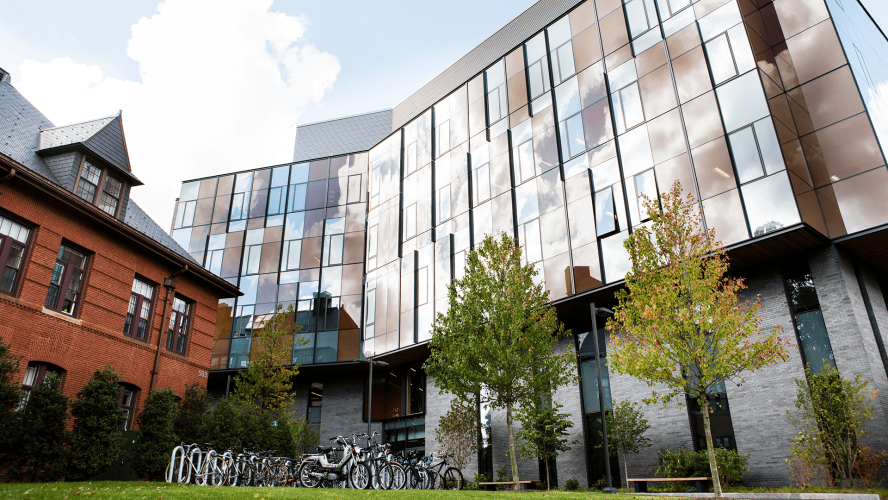Leaders: The fight against COVID-19

At its core, Tufts School of Engineering empowers engineers to address the most pressing societal needs. As COVID-19 has spread throughout communities both locally and across the world, members of the School of Engineering have stayed true to this core tenet by responding to the global health crisis with urgency, innovation, and compassion. Tufts engineers and their colleagues have supported medical workers, protected vulnerable populations, and shared knowledge to help others navigate the complexities of this disease.
The stories below highlight the work of our community. We sincerely thank those who have contributed to these efforts and we look forward to sharing more of your stories as we move through these challenging times.
Supporting Medical Workers
When Tufts Medical Center received a donation of 6,000 N95 masks in March, the elastic bands on the masks were brittle and broken. A group of Tufts engineers joined colleagues from The Fletcher School, MIT, and Harvard University to prototype ways to replace the elastics without damaging the masks. The task force developed a solution, repaired the masks, and shared their methods for others to use.
Jan Sliwa, Tufts School of Medicine alum and anesthesiologist at Scripps Mercy Hospital in San Diego, had an idea for a modified snorkeling mask and needed an engineer to print adaptors that could connect the mask to antiviral filters. William Liu, E21, sprang into action, using the resources of the Nolop Fabrication, Analysis, Simulation, and Testing Facility to prototype snorkel adapters. Within a matter of days, Liu had manufactured effective adaptors and shipped them for use in California. The group of collaborators, which included Stanford University engineers and representatives from Ocean Reef Group, the company that manufactures the masks, shared the print specifications.
A donation effort led by Tufts parents in China, including the parents of engineering students and alumni, delivered 31,000 respirator masks, 2,000 surgical masks, goggles, and medical gowns to Tufts Medical Center in early April. The shipment provided a substantial increase in the hospital’s inventory and overall preparedness. The Fletcher School’s Rapid Response Task Force and Ming Zhong, Director of Asia Relations and Development at Tufts, helped coordinate the shipment to the hospitals.
MSEM students employed by ZOLL Medical Corporation have supported the company’s efforts to produce 10,000 ventilators per month. Dylan Thorp, On-Campus MSEM student and Senior Manufacturing Engineer, has assisted with project management and aligning operations to production goals. Chris Brady, Online MSEM student and Regulatory Affairs Specialist, has ensured that changes in the production process are well-documented and comply with regulatory standards.
Protecting Vulnerable Communities
Engineering faculty and colleagues from Tufts School of Medicine devised a method to monitor COVID-19 symptoms in elderly communities, who are particularly vulnerable to the virus, using automated text messages and phone calls. The program, STOMP-COVID, recruits people ages 65 and older and asks them to report their temperatures twice a day. If a participant’s temperature spikes, a follow-up call is placed to help participants determine the next steps and connects them with assistive resources.
While in a two-week COVID-19 quarantine after traveling home to Thailand, MSIM student Earn Khunpinit worked to ensure that disadvantaged communities had access to affordable, high-quality sanitizing solutions. She mobilized resources and secured Thai Food and Drug Administration approval for a line of hand sanitizing solutions. The product, avia by Union Alcohol, is now being supplied to vulnerable communities and hospitals in Thailand.
Sharing Knowledge
Civil and Environmental Engineering alumna Marlene Wolfe conducted a systematic review of handwashing practices and shared her findings with Tufts Now. The study found that there are no significant differences in the removal of infectious particles on hands when comparing alcohol-based hand sanitizers to soap and water handwashing.
Susan Landau, Bridge Professor in the Department of Computer Science and The Fletcher School, has examined the efficacy of cell phone contact tracing technology and advocated for increased COVID-19 testing. Her work has underscored the role that testing will play in reducing the spread of the disease.
Professor David Gute, who is an epidemiologist and a former state health official in both Massachusetts and Rhode Island, will lead a course this summer titled COVID-19: The Emerging Global Health Crisis (CEE-59). The online class will examine the global reach of the disease by placing it in the context of other emerging and re-emerging diseases such as HIV/AIDS, SARS, measles, and avian flu, and will review how they are transmitted. A link to course registration will follow.
Faculty have also given students the opportunity to turn their classwork toward solutions related to COVID-19. In just one example, in ME-116: Mechanics of Composites and Heterogeneous Materials, Professor of the Practice Mike Zimmerman shifted the course’s final project to allow students to work on designing N95 respirator masks. The project helps students learn first-hand about respirators and the challenges that follow when manufacturing these important pieces of PPE.
As the global response to the pandemic evolves, Tufts engineers will continue to do their part to slow the spread of COVID-19, develop innovative solutions, and help communities adapt to new and challenging circumstances.
View all School of Engineering stories related to COVID-19.